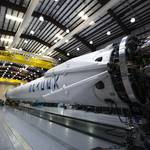Header image by Karl-Ludwig Poggemann, CC BY 2.0
The world has shifted gears. A deep-seated and growing discontent has changed the political landscape. The lack of a coherent vision of the future from those in power – coupled with pathological attempts to manipulate public opinion – has significantly undermined any sense of trust placed in traditional authority.
This lack of vision is pervasive except, perhaps, in the world of technology. Here we see huge strides made with ambitious roadmaps laid out by industry leaders. From Elon Musk to Peter Thiel, Mark Zuckerberg to Jack Ma, alongside the founders of Google, Amazon and Microsoft, the new (exclusively male) techno-billionaire class are presenting a seemingly erudite view of what the future could bring. One filled with modern convenience, longevity, adventure and prosperity. A vision that is rarely shown or expressed from today’s politicians who struggle to speak with any certainty beyond the shortest of soundbites.
But there is a darker side to these newfound voices who speak for humanity, because we are handing our future to the highest bidder with little pause for thought about what the consequences might mean for the foundations of our very existence. Decisions made over the course of the next few decades will have an impact on the direction of human evolution itself as we merge with the technology that was once born of us, but is now ready to return back into its source.
Although we are desperately in need for some new sources of inspiration, shouldn’t we also be resisting the potentially disastrous ramifications of what corporate ownership will mean for this emerging horizon of humanity?
We are, collectively, allowing ourselves to be under the spell of those well placed to be overlords of our new, so-called utopian future. However, alongside this collective apathy there has also long been a strong thread of criticism and warning running through our artistic output. A techno-mythology created over the last century that is trying to articulate aspects of the human condition that are under threat through our never-ending search for progress and rudderless advancement.
Mythology communicates to us archetypal truths best displayed through the layered compositions of fiction, performance, art and music. When it comes to the emergence of mythology that is directly linked to technological advancement, it’s interesting to note that these truths tend to be tied to warnings of oppression and control more often than they are stories of redemption and liberation. They speak to us of the magnitude of what might be lost if we let go of our biological roots too easily and don’t try to maintain a deep-seated connection to what has – thus far, at least – made us truly human.
Mythology also talks to us about identity formation. These stories, imagery and the symbolism embedded within them encode a great deal of cultural wisdom into relatively short forms of expression. If we look at some of the techno-mythologies prevalent today, key themes keep emerging that are worth paying attention to. If I had to pick just four (with some key examples), they would be:
- Beware the repercussions of corporate and government control;
The Lorax / 1984 / Minority Report / Fahrenheit 451 - Attempting to transcend our biological form is dehumanising and corrosive;
Ghost in the Shell / Blade Runner / District 9 / Neuromancer - Visions of utopia are usually potent signifiers of dark days ahead;
Logan’s Run / Brave New World / Gattaca / Metropolis - There is an eternal capacity for love and companionship to overcome oppression.
Avatar / The Children of Men / Wall-E / The Handmaid’s Tale
These tales didn’t emerge out of nowhere, in most cases they are directly addressing the world around the authors and even those set far in the future tend to mirror contemporary political and economic realities. You could easily argue that this is the very basis of the science fiction genre, particularly the more socially oriented parts of it.
Yet we are finding it hard to incorporate these fictional warnings into our current-day activities – even when faced with the fact that they are becoming tangible in some of their darkest and most ominous forms. We should be able to heed the warnings, they have been written into our culture for the better part of a century, but we seem unable to do so.
If all of this is so openly displayed throughout these techno-mythologies, why are we ignoring the lessons they are trying to share?
Part of the answer comes from the sheer complexity of the issues we face. Modern global society is wholly resistant to particular attempts to guide its hand and this complexity also causes many of us to adhere to a more simple approach to responsibility. Preferring to focus on the immediate troubles and opportunities within our own local lives rather than trying to build up any shared vision of what the future might hold for us all collectively.
Complex systems are inherently difficult to steer in a meaningful way, but they are also inherently easy to distract people away from even attempting to because of the overwhelming nature of the tasks at hand. Simple messages designed to sway popular opinion allow us to feel more in control, but unfortunately they are usually a sign that we have succumbed to an external attempt to control our own selves and freedoms.
This complexity and our inherent aversion to it plays right into the hands of those who have the resources, know-how and connections to harness an unprecedented level of power. Tightly intertwined relationships between money, politics and mainstream media has corrupted our democratic systems to the core; while big data and the algorithms to utilise it are handing the mechanisms of techno-omniscience to our new digital overlords. All of this wrapped in a context of universal surveillance and psychological manipulation becoming more targeted and sophisticated with each passing month. Military grade psyops are now used against domestic populations to an unprecedented, astonishingly cynical and corrupting degree.
So what can be done to overcome this deep-seated malice and the associated unease that is capturing our hearts and minds? Here are four suggestions that might help us return to a more fruitful and sustainable path:
- We need to start engaging more actively with the techno-mythologies of our modern age. Not just viewing them as forms of entertainment, but as sources of wisdom and (potentially) redemption.
These creative outputs speak to the core of our human identity and communicate with our social, emotional and spiritual drives. We need to become active participants in this conversation rather than just passive consumers; learning what it means to be moved by something and act, rather than merely feel. By doing so, we can gain the courage to impact the world and break free of the boundaries placed around us by structures that define us merely in utilitarian ways.
- Our time and energy should be placed into initiatives that focus on distributed power, in many different forms, as a way to uplift the unassailable dignity of the human person.
Human dignity is something that both sides of the left-right political spectrum (itself inherently outdated and unhelpful) have begun to use as a weapon, undermining many attempts to uphold it in the long run. Instead, what we need to be taking note of are how subcultures such as the Open Source Movement are redefining what it means to create, produce, own and prosper from our efforts. Open Source has emerged out of the software sector, but there’s no reason why it shouldn’t also widely inform the worlds of engineering, medicine, or entertainment. Creative Commons is one such example that has seen widespread and successful adoption.
- We need to carve out alternative spaces (both public and private) that exist outside of the realms of ownership built by multinational companies, donor-focused political parties, deep-state intelligence agencies and authoritarian despots of all kinds.
When viewed broadly, it is clear that these insatiable power structures are one of the key elements of our techno-mythologies that we need to actively resist and seek to redefine. What these alternative spaces look like can be infinitely varied and, indeed, will need to be highly adaptive to local circumstances and a rapidly changing world. Many experiments will falter, but each should be constructed in such a way as to properly share the outcomes of their efforts so that others might learn from those who fail as readily as from those who succeed.
- We have to continuously renew the pool of techno-mythologies and keep them up to date with the rapidly changing circumstances of the world today.
Alongside innovation and practice, those of us who are inspired to do so need to harness the creative vision of what it means to be human in the 21st century. A vision that emerges from the depths of our being and allows us to authentically connect with other kindred spirits seeking to do the same. Progress without vision leads to dark places detached from a sense of consequence; while vision without progress brings about little more than self-righteous navel-gazing. It is through our art, literature and creative expression that we renew the sense of purpose in what we are doing and why we are doing it.
As the pace of change increases, so must our ability to adapt and respond to the challenge we face. Thankfully, the intuitive places of our collective unconscious have already shown us the dangers that lie ahead. The hard part now is to find a way to listen to this voice calling forth from the core of humanity and interpret, each in our own way and to our own ability, what it means to enact the visions of a better world placed before us.





